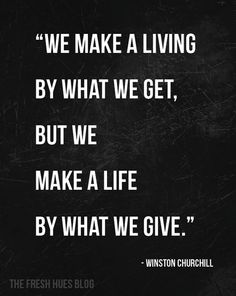According to Statics Canada in 2010, volunteer hours across Canada was the equivalent to over 1 Million full time jobs, or approximately 2 Billion “working” hours. With a majority of these hours being donated to charity and Not For Profit Organizations. It is estimated that almost 70% of all Canadians will give their time to volunteer at some point or another.
All that said, the most expensive commodity a business/person has is their time, but what is the cost of community relations, company moral, loyalty and retention. In the end these can be priceless in the eyes of business. Research shows that when Business and volunteerism combine, the entire community wins. When volunteering is being put to work, in varying degrees, as a strategic asset to help achieve business goals, including managing and changing culture, strengthening the brand, building external relationships, and improving employee engagement. Outside of these several other benefits can be attributed to the combination of business and volunteering, including
- Skill Development
- Leadership Training
- Increased Performance and Productivity
- Community and Social Awareness
- Outside Networking
- Expression of Values
- Increase Collaboration
The list potential benefits is only as big as your imagination. People by nature tend to flock to similar values, and by linking your brand, your employees, or just your time to something local and meaningful, speaks at a greater volume then money can buy. However, there is one important caveat to making volunteerism work for any business. It is simple, the relationship between business and any charity or not for profit needs to be true and without falsehood. The partnership needs to be genuine to the businesses morals, values and must truly benefit all those involved to achieve the desired outcomes.
We live in a time and age were information is at our finger tips, and finding the right organization is as easy as understanding what would be a good fit for you, your business, your employees and your community. To return to the 2010 Statistics Canada Report on Volunteering, they found that the bulk of total volunteer hours (66%) were given to five types of non-profit and charitable organizations: those involved in sports and recreation had the largest share (19% of total hours), followed by social services (18%), religion (15%) education and research (9%) and health (5%).
Its never too early or too late to get involved in something… the only question is when?


